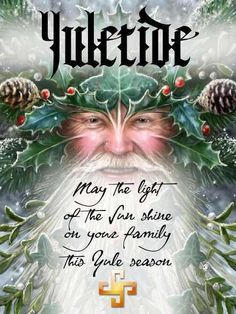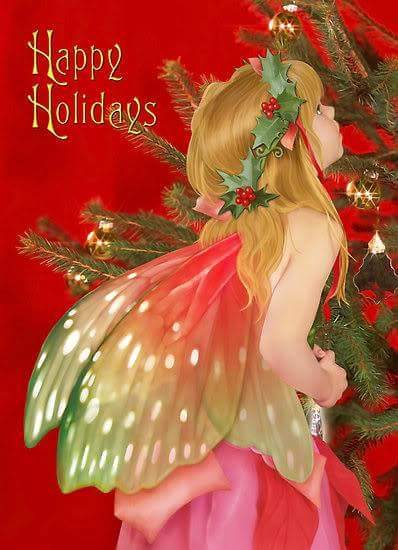It looks like you're using an Ad Blocker.
Please white-list or disable AboveTopSecret.com in your ad-blocking tool.
Thank you.
Some features of ATS will be disabled while you continue to use an ad-blocker.
13
share:
December
Buddhism
Bodhi Day: 8 December – Day of Enlightenment, celebrating the day that the historical Buddha (Shakyamuni or Siddhartha Gautama) experienced enlightenment (also known as Bodhi).
Christianity
Advent: fourth Sunday preceding 25 December
Krampusnacht: 5 December – The Feast of St. Nicholas is celebrated in parts of Europe on 6 December. In Alpine countries, Saint Nicholas has a devilish companion named Krampus who punishes the bad children the night before.
Saint Nicholas' Day: 6 December
Feast of the Immaculate Conception Day: 8 December – The day of Virgin Mary's Immaculate Conception is celebrated as a public holiday in many Catholic countries.
Saint Lucia's Day: 13 December – Church Feast Day. Saint Lucia comes as a young woman with lights and sweets.
Longest Night: A church service to help those coping with loss, usually held on the eve of the Winter solstice.
Christmas Eve: 24 December
Christmas Day: 25 December – one of the most celebrated holidays around the world, increasingly celebrated by Christians and non-Christians alike.[5][6][7][8]
Anastasia of Sirmium feast day: 25 December
Twelve Days of Christmas: 25 December–6 January
Las Posadas: 16–24 December – procession to various family lodgings for celebration & prayer and to re-enact Mary & Joseph's journey to Bethlehem[9]
Saint Stephen's Day: 26 December
Saint John the Evangelist's Day: 27 December
Holy Innocents' Day: 28 December
Saint Sylvester's Day: 31 December
Fictional or parody
Erastide: In David Eddings' Belgariad and Malloreon series, Erastide is a celebration of the day on which the Seven Gods created the world. Greetings ("Joyous Erastide") and gifts are exchanged, and feasts are held.
Feast of Winter Veil: 15 December–2 January – A holiday in World of Warcraft. This holiday is based on Christmas. Cities are decorated with lights and a tree with presents. Special quests, items and snowballs are available to players during this time. The character of "Greatfather Winter", who is modeled after Santa Claus, appears.[10][11]
Feast of Alvis: in the TV series Sealab 2021.[12] "Believer, you have forgotten the true meaning of Alvis Day. Neither is it ham, nor pomp. Nay, the true meaning of Alvis day is drinking. Drinking and revenge."–Alvis[13]
Hogswatch: a holiday celebrated on the fictional world of Discworld. It is very similar to the Christian celebration of Christmas.
Festivus: 23 December – a parody holiday created by Daniel O'Keefe and made popular by Seinfeld as an alternative to Christmas.
Frostivus: the winter holidays in the Artix Entertainment universe
Decemberween: 25 December – a parody of Christmas that features gift-giving, carol-singing and decorated trees. The fact that it takes place on December 25, the same day as Christmas, has been presented as just a coincidence, and it has been stated that Decemberween traditionally takes place "55 days after Halloween". The holiday has been featured in the Homestar Runner series.
Wintersday, the end-of-the-year celebration in the fictional universe of the Guild Wars franchise, starts every year mid December and ends the next year on early January.
Hinduism
Pancha Ganapati: 21–25 December – modern five-day festival in honor of Lord Ganesha, celebrated by Hindus in USA.
Historical
Malkh: 25 December
Mōdraniht: or Mothers' Night, the Saxon winter solstice festival.
Saturnalia: 17-23 December - An ancient Roman winter solstice festival in honor of the deity Saturn, held on the 17 December of the Julian calendar and expanded with festivities through to 23 December. Celebrated with sacrifice, a public banquet, followed by private gift-giving, continual partying, and a carnival.
Dies Natalis Solis Invicti (Day of the birth of the Unconquered Sun): 25 December – late Roman Empire
Judaism
Hanukkah: Ḥănukkāh, usually spelled חנוכה, pronounced [χanuˈka] in Modern Hebrew; a transliteration also romanized as Chanukah or Chanukkah), also known as the Festival of Lights, Feast of Dedication, is an eight-day Jewish holiday commemorating the re-dedication of the Holy Temple (the Second Temple) in Jerusalem at the time of the Maccabean Revolt against the Seleucid Empire of the 2nd century BC. Hanukkah is observed for eight nights and days, starting on the 25th day of Kislev according to the Hebrew calendar, which may occur at any time from late November to late December in the Gregorian calendar.
Paganism
Yule: Pagan winter festival that was celebrated by the historical Germanic people from late December to early January.
Yalda: 21 December – The turning point, Winter Solstice. As the longest night of the year and the beginning of the lengthening of days, Shabe Yaldā or Shabe Chelle is an Iranian festival celebrating the victory of light and goodness over darkness and evil. Shabe yalda means 'birthday eve.' According to Persian mythology, Mithra was born at dawn on 22 December to a virgin mother. He symbolizes light, truth, goodness, strength, and friendship. Herodotus reports that this was the most important holiday of the year for contemporary Persians. In modern times Persians celebrate Yalda by staying up late or all night, a practice known as Shab Chera meaning 'night gazing'. Fruits and nuts are eaten, especially pomegranates and watermelons, whose red color invokes the crimson hues of dawn and symbolize Mithra.
Secular
Human Rights Day: 10 December
Zamenhof Day: 15 December – Birthday of Ludwig Zamenhof, inventor of Esperanto; holiday reunion for Esperantists
Soyal: 21 December – Zuni and Hopi
HumanLight: 23 December – Humanist holiday originated by the New Jersey Humanist Network in celebration of "a Humanist's vision of a good future."[14]
Newtonmas: 25 December – As an alternative to celebrating the religious holiday Christmas, some atheists and skeptics have chosen to celebrate December 25 as Newtonmas, due to it being Isaac Newton's birthday on the old style date.
Quaid-e-Azam's Day: 25 December
Boxing Day: 26 December – Day after Christmas.
Kwanzaa: 26 December–1 January – Pan-African festival celebrated in the US
Watch Night: 31 December
New Year's Eve: 31 December – last day of the Gregorian year
Hogmanay: night of 31 December–before dawn of 1 January – Scottish New Year's Eve celebration
Dongzhi Festival – a celebration of Winter
Unitarian Universalism
Chalica: first week of December – A holiday created in 2005, celebrated by some Unitarian Universalists.[15]
wikipedia
Whatever you celebrate this time of year, I hope you have a special and wonderful time. The time we have here with those we love is never guaranteed, therefore every minute of it precious. Make it count in every way that you can and be grateful for every second.
Happy all of the above Kali!! I am especially thinking of you this weekend.
Much love Zazz
Much love Zazz
new topics
-
F-18 shot down over Red Sea....by our own Destroyer?
Other Current Events: 12 minutes ago -
California Business Owners Blindsided by Surprise Payroll Taxes
US Political Madness: 33 minutes ago -
Anti-Government Protest in Serbia
Social Issues and Civil Unrest: 5 hours ago -
The Effects of Electric Fields and Plasma on Plant Growth
Science & Technology: 6 hours ago
top topics
-
NYPD Chief Jeffrey Maddrey Resigns - Forced Officers to Give Sex for Overtime Pay and Favors.
Posse Comitatus: 16 hours ago, 11 flags -
Swarms of tiny 'ant-like' robots lift heavy objects and navigate obstacles
Science & Technology: 14 hours ago, 6 flags -
The Effects of Electric Fields and Plasma on Plant Growth
Science & Technology: 6 hours ago, 6 flags -
Anti-Government Protest in Serbia
Social Issues and Civil Unrest: 5 hours ago, 6 flags -
The Daily Mail trying to imply “it’s aliens”
Dissecting Disinformation: 13 hours ago, 4 flags -
California Business Owners Blindsided by Surprise Payroll Taxes
US Political Madness: 33 minutes ago, 4 flags -
F-18 shot down over Red Sea....by our own Destroyer?
Other Current Events: 12 minutes ago, 1 flags
active topics
-
F-18 shot down over Red Sea....by our own Destroyer?
Other Current Events • 2 • : CriticalStinker -
California Business Owners Blindsided by Surprise Payroll Taxes
US Political Madness • 1 • : theatreboy -
-@TH3WH17ERABB17- -Q- ---TIME TO SHOW THE WORLD--- -Part- --44--
Dissecting Disinformation • 3784 • : Thoughtful3 -
Drones everywhere in New Jersey ---and Elsewhere Master Thread
Aliens and UFOs • 225 • : Ravenwatcher -
NYPD Chief Jeffrey Maddrey Resigns - Forced Officers to Give Sex for Overtime Pay and Favors.
Posse Comitatus • 10 • : xuenchen -
Labour Plotting to Postpone May's Council Elections ?
Regional Politics • 12 • : gortex -
‘Something horrible’: Somerset pit reveals bronze age cannibalism
Ancient & Lost Civilizations • 14 • : Scratchpost -
China Working on 'Drone Mothership' Plane
Military Projects • 8 • : Scratchpost -
Democrat Leader Hakeem Jeffries Promotes HATE After 2nd Attempt to Murder Trump in 2024.
US Political Madness • 44 • : marg6043 -
U.S. Officially Withdraws From the World Health Organization
Breaking Alternative News • 76 • : marg6043
13


